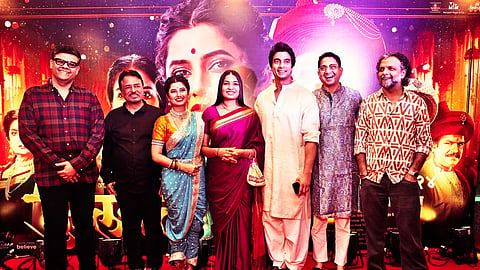

Phulwanti, directed by Snehal Tarde and produced by debutant producer Prajaktta Mali, is an ambitious historical drama based on the renowned novel by Padma Vibhushan Babasaheb Purandare.
The film transports viewers to the Peshwa era, weaving together themes of pride, sacrifice, love, and art, all through the captivating story of Phulwanti—a skilled and proud Marathi dancer.
The plot begins in the Mughal court of Delhi, where Phulwanti (played by Prajaktta Mali) performs an enchanting dance that earns the admiration of the emperor.
However, when the emperor tries to impose conditions on her art, Phulwanti, known for her self-respect and strong will, refuses to comply, declaring that art is free and cannot be bound by rules. This sets the tone for her journey as a proud artist who refuses to bow to authority, even as her fame spreads across India.
The narrative takes a significant turn when Gopalkrishna Bakhare (played by Prasad Oak), a wealthy merchant from Pune, invites Phulwanti to perform at a family wedding. Initially hesitant, she agrees on one condition—that her performance takes place at the historical Shaniwarwada.
Phulwanti believes that performing there would complete her artistic journey, as she reveres the ground Mastani once walked on. However, her performance at Shaniwar Wada results in humiliation, leading her to seek justice from Savai Madhavrao Peshwa (played by Kshitee Jog).
This incident sparks a confrontation with the great scholar Vyankatdhwari Shastri (played by Gashmeer Mahajani), and the story unfolds into a deeper exploration of pride, intellect, and artistry.
Prajaktta Mali shines in the titular role, bringing grace and strength to the character of Phulwanti. Her dance sequences are mesmerizing, and she effectively portrays the complex emotions of pride, love, and sacrifice.
Gashmeer Mahajani delivers a strong performance as Vyankatdhwari Shastri, embodying the intellectual intensity required for the role. Supporting actors like Prasad Oak, Kshitee Jog, Deepti Lele, and Vaibhav Mangle also give commendable performances, adding depth to the narrative.
Director Snehal Tarde has done an impressive job in handling such a challenging historical subject in her debut film. The film successfully recreates the grandeur of the Peshwa era, with art director Eknath Kadam and cinematographer Mahesh Limaye playing pivotal roles in bringing the period to life.
The sets, costumes, and overall visual appeal are a treat for the audience, immersing them in the historical setting. The film’s music, composed by Avinash-Vishwajeet, is another highlight, with soulful melodies that complement the film’s themes of love, pride, and artistry.
